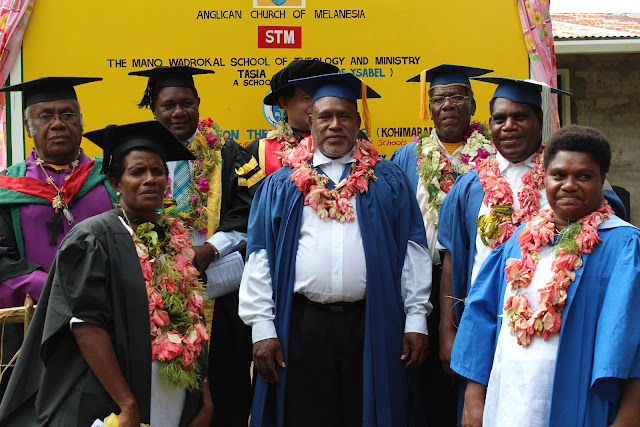Diploma in Theology Program opens in Isabel
The Diocese of Ysabel of the Anglican Church of Melanesia officially launched and inaugurated the Diploma in Theology Program at the Mano Wadrokal School of Theology and Ministry at Tasia, Isabel Province on Thursday last week. Celebrations to mark this official launching and inauguration was held at the Diocesan Headquarter at Jejevo.
Guest of Honor to the ceremony, Hon. Varian Longamei together with the Chairman of the Bishop Patterson Theological College Board of Governors, the Most Rt. Rev David Vunagi and Vicar General of the Diocese of Ysabel Fr. Eddie Rubaha jointly launched the school sign board. Inauguration was conducted by his Grace, Archbishop Vunagi.
Witnessing this occasion was the General Secretary of the Anglican Church of Melanesia (ACOM), Mr. George Kiriau and Wife, other prominent staffs from ACOM Provincial Head Office, representatives of Mano Wadrokal family from New Caledonia, Principal and other members of faculties from BPTC Kohimarama, representatives from Isabel Provincial Government, representatives from Isabel house of Chiefs, members around Jejevo and staffs, students and families of Mano Wadrokal College.
The ceremony marks decentralization of Certificates and Diploma programs in Theology down to the Diocesan Level. Mano Wadrokal School of Theology and Ministry is one of the three newly established School of Theology and Ministries (STM). The other two STM were Airahu from the Diocese of Malaita and Fisher Young from the Diocese of Bank and Torres in Vanuatu.
The decentralization was something initially talked over since 2006. Today, Church feels that the timing is now right to decentralize the program in order to allow for quality theological education training accessed at the Diocesan Level. This would allow opportunities for both men and women who aspires undertaking Theological studies. The training was oriented in such a way that theological reflections will base on real issues of time and space and to allow wider participation of the church from the top to the rural level, where people can feel responsible and actively participate whenever such opportunities were provided.
With this move, BPTC would be concentrating providing Bachelor of Theology Programs only and at the same time supervises the academic requirements of the program on behalf of the South Pacific Association of Theological Schools (SPATS), an Accreditation Body responsible for accrediting Theological Schools/Colleges in the South Pacific.
According to the Coordinator for Theological Education Review of BPTC Collage, Rev. Ben Wate, decentralization of Diploma and Certificate program to the Diocese does not mean drop as far as quality of education is concern. Rather standard would remain the same as offered at BPTC, Kohimarama. There were currently 8 students undertaking Diploma studies at Tasia, STM so as Airahu in Malaita. Entry requirements include sitting of the Entry Examination with a minimum pass Mark of 65% and above. Candidates must also be approved and endorsed by the Diocesan Bishop. Teaching staffs would have a minimum qualification of Bachelor Degrees with Credit pass. Duration of the program would be three years. The STM programs consist of four disciplines namely Theology & Ethics, Church History, Biblical Studies, and Church Ministry, and will work towards introducing the interdisciplinary courses in social sciences, particularly in the field of Sociology, Anthropology, gender studies and Human Rights.
The Chairman of BPTC Board of Governors, Archbishop Vunagi acknowledges the Diocese of Ysabel and hard working staffs of BPTC, Kohimarama for commitment and support in bringing the dream about Mano Wadrokal to reality. Enrolments for the next intake will again continue this year.
The Principal of Mano Wadrokal Collage, Rev. Ellison Quiti also acknowledges ACOM Provincial Office and BPTC for engineering the birth of this new college. He also appeals to the good people of Isabel, Business houses, the Provincial government and the Church to render continual support and assistance for forward development of the college. Having better infrastructures that would enhance efficient and effective learning was one of the primary objectives of the college.
The occasion marks an important step in the development of theological education and training in the Anglican Church of Melanesia.



No comments:
Post a Comment